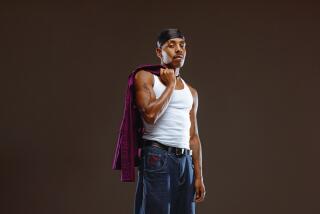Expanding the Reggae Trance Rhythm
- Share via
Even reggae music has room to grow. The genre’s true artists know it’s not enough to sing piously of God and freedom across a simple trance rhythm.
As Steel Pulse demonstrated again Saturday at the Teva Spirit of Unity festival at Irvine Meadows Amphitheatre, the most meaningful reggae is made by those willing to push the form a little further.
The veteran, British-based group’s sophisticated rock-reggae mix is precise and often moving, and they even attempted a pop-reggae mix when Selwyn Brown stepped out from behind his keyboards to rap on “Taxi Driver.”
As with Saturday’s other participants, Steel Pulse’s best moments came by demonstrating that the basic reggae trance rhythm could become a canvas of endless possibility, rather than an avenue of monotony.
That dynamic vision unfortunately was not shared by soulful reggae crooner Beres Hammond, who seemed content with his rumbling beat and flat songwriting.
By contrast, Jamaican-born Shaggy walked onstage with some energetic hip-hop attitude, mixing crisp raggamuffin rapping and pop melodies accessible enough for the Top 40 crowd. A clean-cut frontman in a bright yellow shirt, Shaggy and his band offered the least traditional set of the day while calling on the surprisingly small crowd to clap and sing along.
For connoisseurs of African pop, the appearance of South African artist Lucky Dube was the main event of the day. Though largely unknown in the U.S., his big-band reggae sound was uplifting and dynamic, blending ragga essentials with an Afro-pop flavor, inspiring much of the crowd to its feet.
Dube was given to broad, dramatic gestures, carrying himself like the star he is in Africa. Not content with his 10-member band’s deep reggae groove, the singer led the group through rich instrumental flourishes and tightly choreographed dance steps.
He tossed in surprising pieces of western pop music, from Bob Dylan’s “Knockin’ on Heaven’s Door” to Deep Purple’s “Smoke on the Water,” but was equally effective with messages on peace and unity.
An early high point came from Nasio Fontaine, a young and charismatic reggae traditionalist whose pumping, thumping riddims offered occasional bursts of electric guitar and squealing organ.
More to Read
The biggest entertainment stories
Get our big stories about Hollywood, film, television, music, arts, culture and more right in your inbox as soon as they publish.
You may occasionally receive promotional content from the Los Angeles Times.











